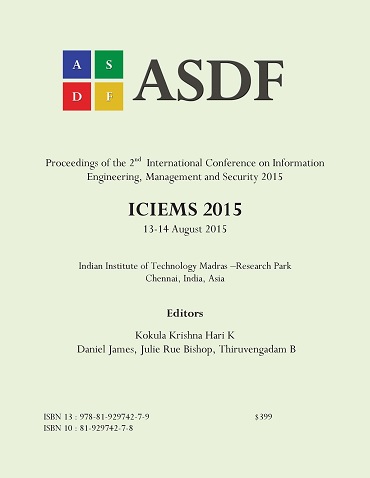- Publication Meta:Value
- Short Title:ICIEMS 2015
- Publisher:ASDF, India
- ISBN 13:978-81-929742-7-9
- ISBN 10:81-929742-7-8
- Language:English
- Type:Hard Bound - Printed Book
- Copyrights:ICIEMS Organizers / DCRC, London, UK
- Editor-in-Chief:Kokula Krishna Hari K
- Conference Dates:13 - 14, August 2015
- Venue Country:IITM-RP, Chennai, India
- Submitted Papers:410
- Acceptance Rate:4.11%
- Website:www.iciems.in
Welcome to ASDF Electronic Digital Library!
ICIEMS 2015
ICIEMS 2015
International Conference on Information Engineering, Management and Security 2015
Paper 025
An Optimize Utilization of Carrier Channels for Secure Data Transmission, Retrieval and Storage in Distributed Cloud Network using Key Management with Genetic Algorithm: A Review
C A Dhote1, Virendra P Nikam2
1Professor, Badnera College of Engineering,Badnera, 2Phd Scholar
Abstract
Relay transmission can enhance coverage and throughput, whereas it can be vulnerable to eavesdropping attacks due to the additional transmission of the source message at the relay. Thus, whether or not one should use relay transmission for secure communication is an interesting and important problem. In this paper, we consider the transmission of a confidential message from a source to a destination in a decentralized wireless network in the presence of randomly distributed eavesdroppers. The source-destination pair can be potentially assisted by randomly distributed relays. For an arbitrary relay, we derive exact expressions of secure connection probability for both colluding and nonpolluting eavesdroppers. We further obtain lower bound expressions on the secure connection probability, which are accurate when the eavesdropper density is small. Using these lower bound expressions, we propose a relay selection strategy to improve the secure connection probability. By analytically comparing the secure connection probability for direct transmission and relay transmission, we address the important problem of whether or not to relay and discuss the condition for relay transmission in terms of the relay density and source–destination distance. These analytical results are accurate in the small eavesdropper density regime.
Keywords
Author's Profile
Author profile can be generated and linked through our partners World Book of Researchers. To include your profile online Click Here. After it is approved, please email to edlib @ asdf.res.in to create a link with all the papers.
e-AID
ICIEMS.2015.025
Cite this Article as Follows
C A Dhote, Virendra P Nikam. "An Optimize Utilization of Carrier Channels for Secure Data Transmission, Retrieval and Storage in Distributed Cloud Network using Key Management with Genetic Algorithm: A Review." International Conference on Information Engineering, Management and Security (2015): 152-158. Print.
© 2010 - by EDLIB .
All Rights Reserved.

